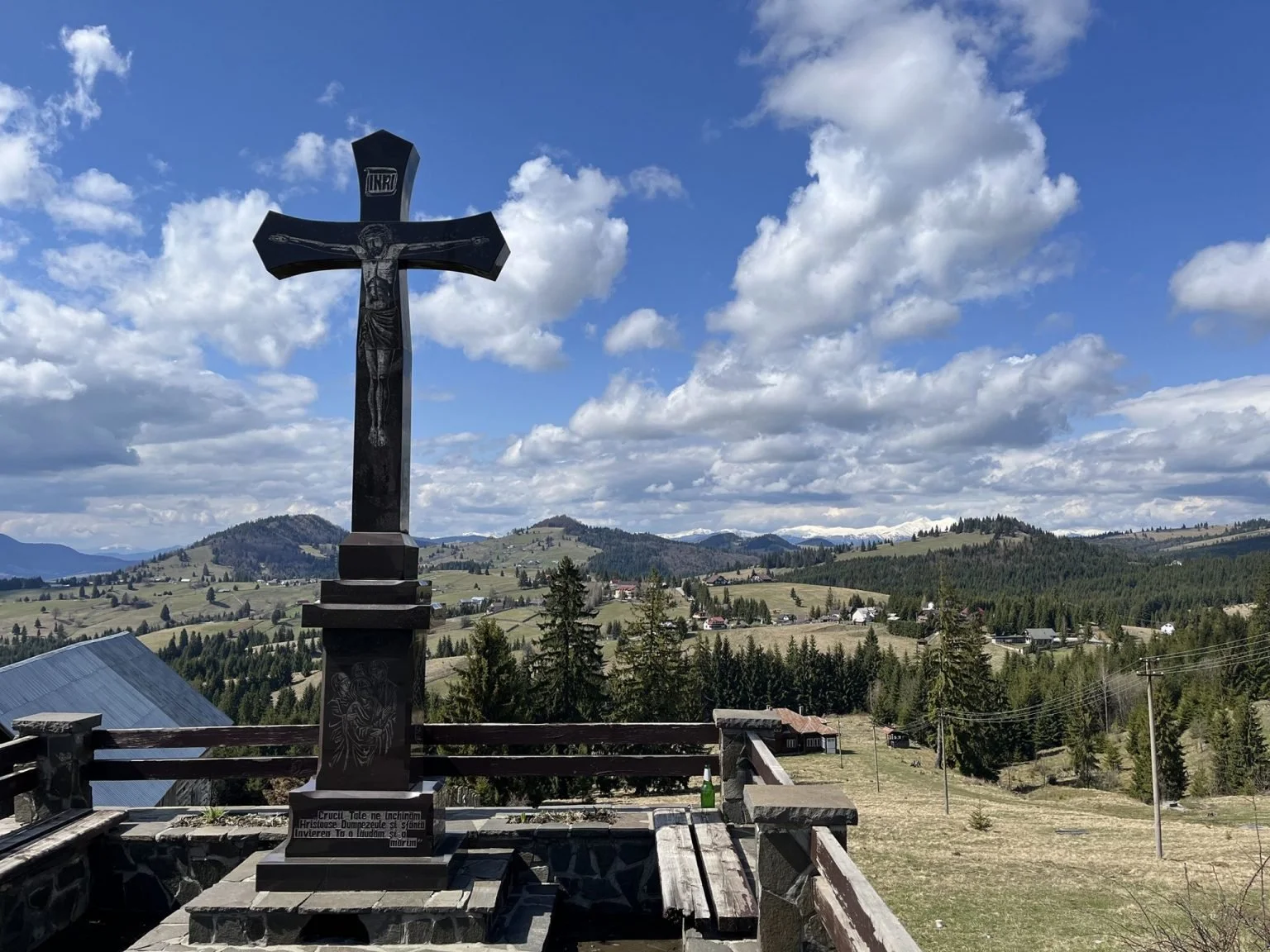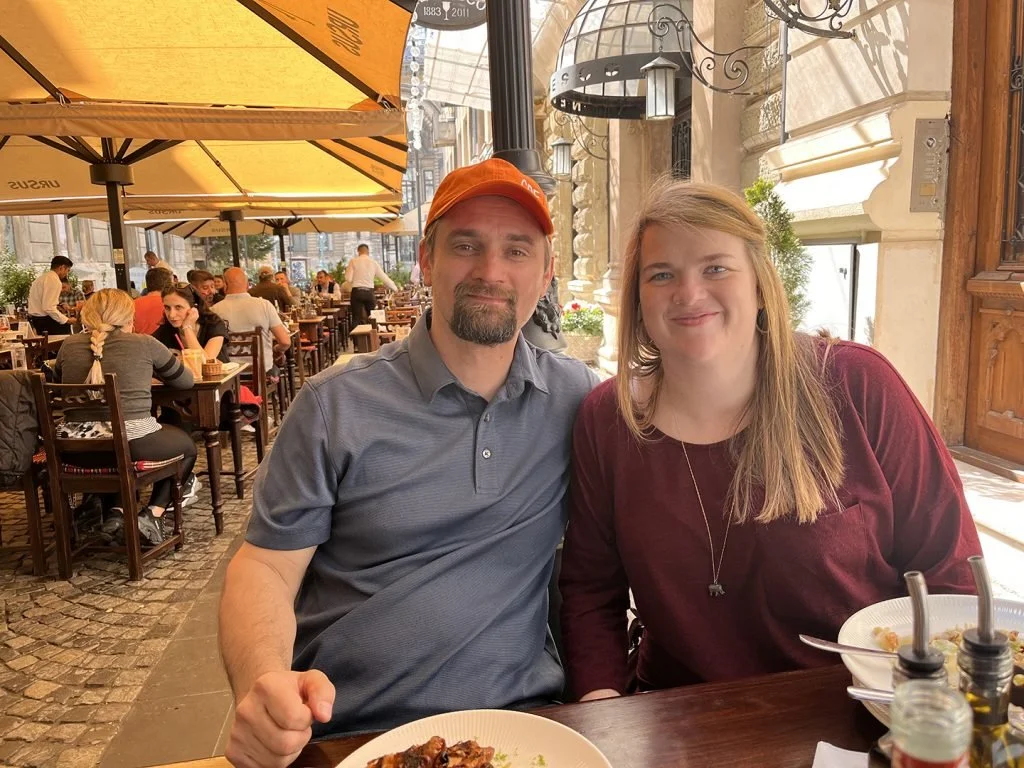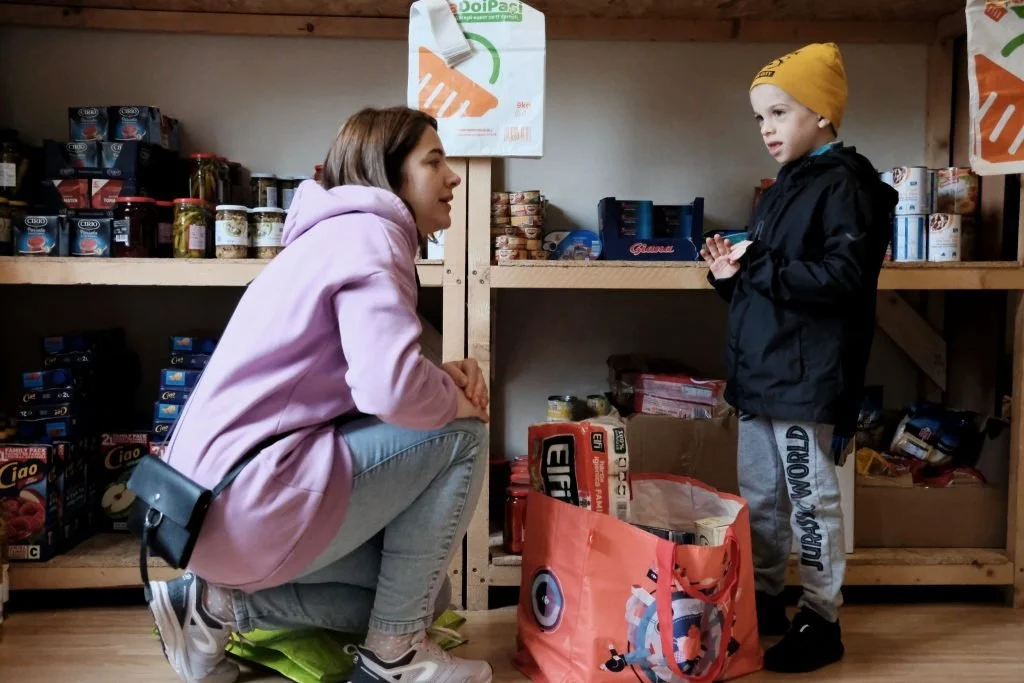From Bucharest To Transylvania, Romanian Churches Serve Ukraine
A roadside cross in Transylvania. Photo by Erik Tryggestad
ORADEA, Romania— He wears a bright blue-and-yellow sweatshirt, the colors of the Ukrainian flag, over his flak jacket.
That’s how Adi Voicu crosses the land border between his native country, Romania, and Ukraine. It’s not that he’s concerned about shrapnel striking him as soon as he enters the war-torn Eastern European nation, he explained. He’s been advised that, customs-wise, it’s easier if he wears it through the checkpoint.
It also frees up a hand to carry relief supplies.
Voicu, who ministers for a Church of Christ in the southwestern Romania city of Craiova, has a passport full of Ukrainian stamps — all acquired in the two months since the Russian invasion began. He assists churches across Romania — including the Cluj-Napoca Church of Christ, about five hours from the border — as they coordinate shipments of supplies and help refugees resettle.
Volunteers from Romania, Ukraine and the US gather outside the meeting place of the Cluj-Napoca Church of Christ, which has become a relief center since the war began. Represented are Sunset International Bible Institute, The Christian Chronicle and Program for Humanitarian Aid. Photo by Audrey Jackson
He’s also a tour operator and driver. This week he’s ferrying a group from Sunset International Bible Institute and The Christian Chronicle across the region to visit Churches of Christ involved in relief work. Sunset, a ministry training program associated with Churches of Christ, seeks to develop effective, long-term strategies to help thousands of Ukrainian refugees scattered throughout Europe and millions of internally displaced people still living in Ukraine.
Voicu’s cell phone chimed with texts and sang with voice calls — his ringtone is “Coat of Many Colors” by Dolly Parton — as he drove the group toward Romania’s border with Hungary on Monday afternoon. A Ukrainian family wanted to know about staying in the church building back in Craiova.
“How long are you planning to stay?” he asked. “Until the end of the war or until a certain time?”
After a few minutes of conversation, he said, “Don’t worry. We will take good care of you.”
Following are a few snapshots from the congregations visited by the Chronicle in Romania:
• BUCHAREST — Eugen and Kathryn Ana figured that they’d end up back in Romania someday.
They didn’t plan for that day to be today.
The couple — he’s from Romania, she’s from Alabama — spoke with the Chronicle about the sudden call they answered to serve refugees from Ukraine through Christian Relief Fund, or CRF. Eugen Ana has worked with CRF, which receives support from Churches of Christ and individual Christians, since he was a teenager in the 1990s. The nonprofit operates a child-sponsorship program in countries around the world, including Romania.
Eugen and Kathryn Ana speak with The Christian Chronicle about their relief mission with Christian Relief Fund. Photo by Erik Tryggestad
Since the war began, CRF has collected funds to help in relief efforts. That brought the Anas back to Romania. They made quick plans to relocate. The whole process took about a week and a half, Eugen Ana said. Now they make regular trips to the border near the besieged Ukrainian city of Odessa to help refugees fleeing the war.
“It’s like organized chaos,” Kathryn Ana said of the situation on the border in the early days of the war. At first, those coming across needed warm clothes and temporary shelter. Now, as the summer approaches and as the flow of refugees slows, long-term needs are coming to the forefront. Refugees are spreading across the continent in search of housing and jobs.
“The needs are changing all the time,” Kathryn Ana said.
• PITESTI — There’s a Singer sewing machine in the middle of the Church of Christ’s auditorium in this southern Romanian city. The tables and chairs are filled with quilts that were handmade by church member Elena Dinca.
“For me, I’m telling you it is relaxing,” she told the Chronicle and visitors from Sunset as she leaned over her handiwork, making little adjustments here and there. “For me it’s a joy to do the work.” She’s glad that the quilts will go to Ukrainian refugees in Pitesti and other cities in her homeland.
Elena Dinca makes adjustments to bedding materials she has sewed for Ukrainian refugees. Photo by Audrey Jackson
The church, established in 1995, is housing a refugee family in its facility.
“I hope this madness will be over for their sake,” said Cristina Sirbu, a church member who is coordinating the congregation’s relief efforts. She was baptized the same year the church was established and works with missionary Harvey Starling. She’s translating Bible commentaries into the Romanian language.
The Pitesti church is part of a network of seven Churches of Christ in southern Romania that have rotating preachers. The churches sponsor joint workshops and Bible training courses.
As the visitors prepared to leave, a Ukrainian mother and her 5-year-old daughter who are staying in the church building arrived. The mother told us that her daughter likes getting hugs from the group’s driver, Adi Voicu. His beard reminds her of her father, who’s back in Ukraine.
• SIBIU — “More prayers have been lifted up for Ukraine in the past two months than in the past two years,” minister Claudiu Murtaza said. “I’m grateful that God didn’t leave them alone.”
Claudiu Murtaza, right, speaks with Brandon Price of the Ukrainian Bible Institute during a visit to Sibiu, Romania. Photo by Erik Tryggestad
Murtaza, minister for the Sibiu Church of Christ in the central Romanian region of Transylvania, talked with the Chronicle about his congregation’s efforts to help the refugees. The 40-member church wants to do more.
The walls of the Sibiu church’s building are lined with posters made by youths for the annual Lads to Leaders events in Romania, which coincide with Lads to Leaders Easter weekend conventions held across the U.S.
• CLUJ-NAPOCA — The baptistery here is full of vegetables.
A Church of Christ in this northern Romanian city has transformed its facility into a relief center for those fleeing the conflict just across the border in Ukraine. It’s the closest congregation in the fellowship to the war-torn nation.
Yulian Parfenenko, 6, helps his mother, Alyona, with grocery shopping at the free resource center run by the Cluj-Napoca Church of Christ in Romania. The Parfenenko family fled Odessa, Ukraine, at the beginning of March. Photo by Audrey Jackson
Read Erik Tryggestad’s report on the church: “A frantic trip to the grocery store.”
This piece is republished from The Christian Chronicle. Chronicle President Erik Tryggestad and associate editor Audrey Jackson are traveling across Eastern Europe reporting on the war in Ukraine and its impact on Churches of Christ.






